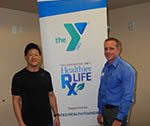 January is here, and I have a confession – I have a love-hate relationship with this time of year. While I love the season of change and new beginning, I am not a huge fan of the laundry list of New Year’s resolutions that accompany the highly anticipated January 1st. It is estimated that 50% of us create a New Year’s resolution with most commonly including weight loss, exercise, improved money management, and debt reduction. Research also has shown that most fall short after only two weeks of continued effort. Typically, most people are back where they started, if not even further behind, by December. For this January, let’s not make any empty resolutions. Let our efforts to reinvent ourselves or be the best version of self be rooted in a realistic plan for lifestyle changes worth following all year.
January is here, and I have a confession – I have a love-hate relationship with this time of year. While I love the season of change and new beginning, I am not a huge fan of the laundry list of New Year’s resolutions that accompany the highly anticipated January 1st. It is estimated that 50% of us create a New Year’s resolution with most commonly including weight loss, exercise, improved money management, and debt reduction. Research also has shown that most fall short after only two weeks of continued effort. Typically, most people are back where they started, if not even further behind, by December. For this January, let’s not make any empty resolutions. Let our efforts to reinvent ourselves or be the best version of self be rooted in a realistic plan for lifestyle changes worth following all year.
Here are my four action steps when making a resolution or any lifestyle change you can follow all year.
- Clarify the PROBLEM
The first step in any meaningful change will be to first identify the correct problem. Many times, we have goals we set, but we don’t take the time to explore the key issues preventing our success. With my weight-loss clients, for instance, most have accomplished weight loss at some point in their life, but they are not successful with KEEPING the weight off. I find the true problem not in the ability to lose weight but to sustain the habits that found them success in the first place. We then reframe the question to “how can we maintain our weight after losing it?” This often puts things into a different framework, and our approach isn’t centered on weight but moreso the ability to be consistent with daily habit changes. By clarifying the true problem, we get a better idea of the big picture and focus on the appropriate solutions.
- Commit to the PRACTICE
After you have identified the problem and found the right idea and/or method for your solution, you must practice and be in a “practice” mindset. Let me explain. Too often, we commit to a process in order to reach a specific goal, and it becomes a project. So much emphasis is placed on the outcome that we miss the beauty and learning potential in the process. Projects often have deadlines and often cease at the first sign of failure. Instead, make yourself accountable to goal behaviors and rarely to goal outcomes. I find these behaviors lead to lasting changes and will create your eventual success. Focus on the process, not the project.
- Find your PASSION
We all know that motivation is a powerful tool. Passion is the intrinsic motivation that drives the practice. I don’t proclaim that everyone has to turn into a health guru or fitness enthusiast when trying to lose weight, but you must cultivate a sense of self-care and self-love that drives you toward a healthy behavior. When you have passion, you do not have to rely on extrinsic motivators. When you have passion, your struggles aren’t as daunting as you look within to reignite your drive and ultimately the process.
- PERSEVERANCE Over Persistence
Finally, you must understand that, with anything worth changing, there will be ups and downs. There will be times when motivation is absent. You must recognize that perseverance will power you through these low points. Persistence allows you to commit to a course of action, no matter the outcome. While perseverance is steadfastness in doing something despite the difficulty or delay in achieving success, with perseverance, you can disengage from failed strategies to seek new ones without leaving the actual process. Successful people choose perseverance over persistence and understand that quick fixes are rarely the solution and rely on calculated changes over time.
In life, as in health and wellness, more than half of us are destined to fail with the resolutions we create. For 2018, I challenge you to skip the list of resolutions. Take the time of self-exploration and identify a problem worth fixing, develop a realistic action plan, be passionate about the practice, and simply persevere.

Dr. Jennifer Waddy shares a passion and vision for helping others lead healthier lifestyles and sees this as her niche to serve. She has heavily been involved in the fitness arena since participating in sports early on to her undergraduate degree in Exercise Physiology. Always wanting to be a physician, she earned her medical training from Duke University where she conducted clinical research in cardiac rehabilitation and explored the benefits of a medically supervised comprehensive wellness program. For more information, visit http://www.enduranceweightloss.com.


